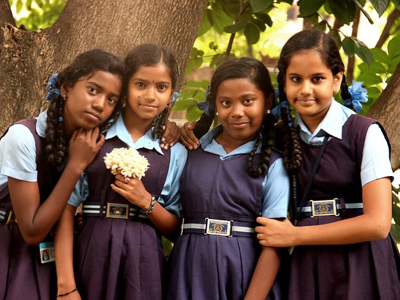Recently we visited a public school in Hyderabad to address girls.
 As I started to introduce myself and shared that the topic of discussion was menstrual hygiene management, the room when the quiet and the I could see the girls share curious glances with each other.
As I started to introduce myself and shared that the topic of discussion was menstrual hygiene management, the room when the quiet and the I could see the girls share curious glances with each other.
The girls seemed a bit shy in the beginning but they soon became comfortable with the topic. We started with some ice-breaking activities and went on to discuss best practices to manage menstruation. Theoretically they were well aware about menstruation as a biological process. I felt the need was to help them overcome inhibitions relating to menstruation that had been passed on to them by other women. I tried to emphasise that they must accept periods as a natural process and stop thinking of menstruation as a dirty thing or something that should be kept a hidden secret.
As we moved on to discussing commercial sanitary napkins, I realised they knew that disposables are loaded with chemicals and made of mostly plastic. They knew these chemicals may lead to serious diseases such as ovarian cancer. I was glad to take them through details of disposables and explained the prospective health risks of using disposables.
The next part of presentation was discussing impacts of disposables on our environment. I took the girls through the details of how our surroundings are impacted by increasing use of disposables. I shared with them the amount of sanitary waste generated by us year on year, how is it dumped in grounds or burnt or littered on roadsides and how it gets blocked in sewage and needs to be unblocked by conservancy workers risking their lives. They were surely disappointed with this information.
While we were discussing disposables and their harmful impacts, I could clearly sense their curiosity about wanting to know if not disposables, then what? After all they had been introduced to disposables since the time of their first period and their mums have been using them throughout their menstrual age. So what are the alternatives available? Of course they knew about cloth as one of the means of managing menstruation, but they had many questions regarding its ease of use. So I took them through the benefits of using cloth pads and how the modern day cloth pads are easy to maintain and use.
When we started discussing menstrual cups, I was pleasantly surprised to know that a few girls already knew about cups however they were scared about them as they thought the cup was placed inside the uterus. I saw a breeze of satisfaction when I told them that it was placed below the cervix and not inside the uterus. They were quite impressed to know the level of comfort that comes with using cups – the ease of using them and no side effects of using disposables which makes menstruation an unpleasant experience for most of women.
Lastly, we ended our meeting with a promise that they will continue to educate themselves about the sustainable ways to manage menstruation, maintain good health by eliminating chemical exposure during menstruation and adding our little bit to safeguard our environment by eliminating possibilities of sanitary waste disposal.
I’m feeling hopeful for young girls for they are the foundation of our society and the change catalyst and they can promote sustainable ways of managing menstruation.
Written by anju Arora, Fouder of Naari, Women Wellness






